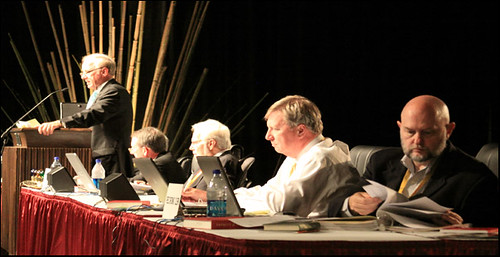I have to admit that when I first heard the term “abductive reasoning,” I thought it was a joke. To use the term abduction in relation to reasoning seemed funny to me. This fall, I viewed the True U videos in which Stephen Meyer presents the case for Christian theism. He argued that the best way to answer the question of God’s existence was through the use of abductive reasoning. So, what is it?
I would recommend to you the much better explanation of this matter by Kenneth Samples who recently gave lectures on apologetics to “The Academy” at Kim Riddelbarger’s church in Southern California. I listened to these shortly after I began watching the videos, and I was somewhat surprised to find him presenting exactly the same thing.
However, I would also try to give a brief explanation myself. Abductive reasoning seeks to give an explanation as to why a past even occurred. Deductive reasoning simply draws out implications in a premise. Inductive reasoning seeks to make predictions based on laws and patterns in nature. Abductive reasoning tries to give an explanation of why a specific event that did not have to occur did in fact occur.
For example, let us take the matter of electric lights. If an electric light comes on, then we can guess based on induction that someone turned on a switch. However, if we ask, why was this particular light turned on at this particular time, then I need to use abduction. There is no law that would say that my son must be the one who turns on an electric light. However, if I see him standing near the light switch and no one else is in the building, then the best explanation for the light coming on is that my son did it.
One important tool in abductive reasoning is Occam’s razor, that is, you don’t look for a complicated explanation when a simple one will do. So, for example, in the case mentioned above, it is possible that six people turned on the light, but the simpler explanation is that one person did it. It is also possible that someone turned on the light and then ran out the door before I could see them, but it is simpler to assume that my son did it. So, we are looking for the best explanation that adequately explains the cause.
The argument that Meyer makes in the True U videos as well as in his book The Signature in the Cell is that there is information in DNA that communicates by transferring arrangements of four different combinations. Meyer argues that there is something like that. It is computer language. The simplest and most adequate explanation of this coded information is an intelligent designer.
Further, scientists recognize that this distinction is present in the scientific endeavor. At first, Meyer was in doubt about the distinction between two different types of science, one inductive and one abductive. However, he found that this distinction was actually commonplace among scientists. For example, he notes that Stephen Jay Gould, a prominent evolutionary paleontologist, made this distinction:
Stephen Jay Gould, the Harvard paleontologist and historian of science, insisted that the “historical sciences,” such as geology, evolutionary biology, and paleontology used different methods than did “experimental sciences” such as chemistry and physics. Interestingly, he also argued that understanding how historical sciences differed from experimental sciences helped to legitimate evolutionary theory in the face of challenges to its scientific rigor by those who questioned its testability. . . . [H]e empahsized that historical scientists test their theories by evaluating their explanatory power.
The distinction was not at all uncommon as Meyer had first supposed. He also found it in the writings of Charles Lyell and Charles Darwin.
I have found this distinction to be quite helpful, and I would encourage you to listen to Kenneth Samples’ lectures for a much fuller explanation.

